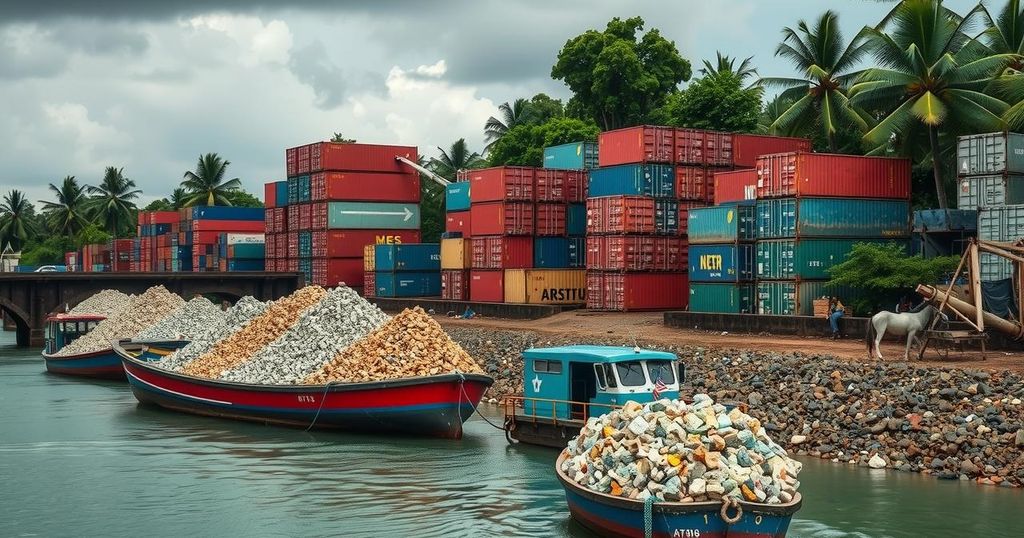A U.N. report reveals that rebels in eastern Congo illicitly exported 150 metric tons of coltan to Rwanda, leading to substantial contamination of the region’s mineral supply chains. The M23 movement has established control over mineral transport routes, collecting significant revenue from these operations. As a result, technology firms are faced with challenges in sourcing conflict-free minerals, amid growing legal scrutiny regarding their supply chains.
A recent United Nations report has revealed that rebels in the eastern Democratic Republic of Congo illegally exported at least 150 metric tons of coltan to Rwanda last year. This fraudulent activity has resulted in significant contamination of the mineral supply chain within the Great Lakes Region, notably impacting the sourcing of minerals essential for the electronics industry. Following the M23 movement’s seizure of the Rubaya area in April 2022, mineral transport routes from Rubaya to Rwanda became controlled by these armed groups, allowing Congolese minerals to be mixed with Rwandan production.
The report, published by the U.N. Security Council’s Group of Experts, emphasized that this represents the most extensive contamination of ineligible minerals detected in the region over the past decade. With M23’s new authority over the region, they established a mining ministry, monopolizing coltan exports from Rubaya, a location renowned for its vast mineral deposits. The rebels reportedly collected upwards of $800,000 monthly in taxes related to coltan production.
Furthermore, the rebels implemented measures to retain laborers by doubling wages for diggers and enforced forced labor for infrastructural developments needed to facilitate transport. These actions maintained strict control over whom could trade these minerals, significantly complicating the procurement process for technology manufacturers under government and societal scrutiny regarding conflict minerals. In December, legal actions were initiated by Congo against subsidiaries of Apple, accusing the company of integrating conflict minerals into its supply chain. However, Apple has denied these allegations, asserting it has instructed suppliers to avoid materials sourced from the conflict zones in question.
The Democratic Republic of Congo is rich in valuable minerals, such as coltan, which is critical for manufacturing electronic devices. The eastern region has been plagued by conflicts for decades, particularly involving various armed groups exploiting these mineral resources. The M23 movement, an organization reportedly supported by Rwanda, has been involved in ongoing skirmishes which exacerbate the region’s instability. The U.N. has long documented the illegal export activities affecting the mineral supply chains, linking these practices to broader issues of human rights and economic exploitation. The complexity of sourcing minerals responsibly is intensified for global technology companies as they face increasing pressures to ensure ethical supply chains that do not contribute to conflict or warlord activities. Conflicts in the region have seen armed groups seize control of mining areas, subsequently leading to reports of human rights abuses, including forced labor and child labor. Many international companies are now tasked with ensuring compliance with strict regulations aimed at preventing the financing of conflict through their supply chains. Apple’s legal challenges emphasize the increasing accountability that corporations face concerning the origins of their materials. The situation highlights the urgent need for ethical sourcing practices in a sector that heavily relies on minerals extracted under difficult and often dangerous circumstances.
The U.N. report highlights the alarming trend of illegal mineral exports by armed groups in the Democratic Republic of Congo, particularly the M23 movement, which has exploited local resources amidst ongoing conflict. The contamination of mineral supply chains has significant implications for global technology manufacturers striving to ensure ethical sourcing. This situation underscores the complex and often perilous dynamics of mineral extraction in conflict zones, calling for heightened accountability and scrutiny from industry stakeholders. In parallel, the legal challenges faced by companies like Apple indicate an increasing demand for transparency and responsible mining practices on a global scale.
Original Source: www.hindustantimes.com






